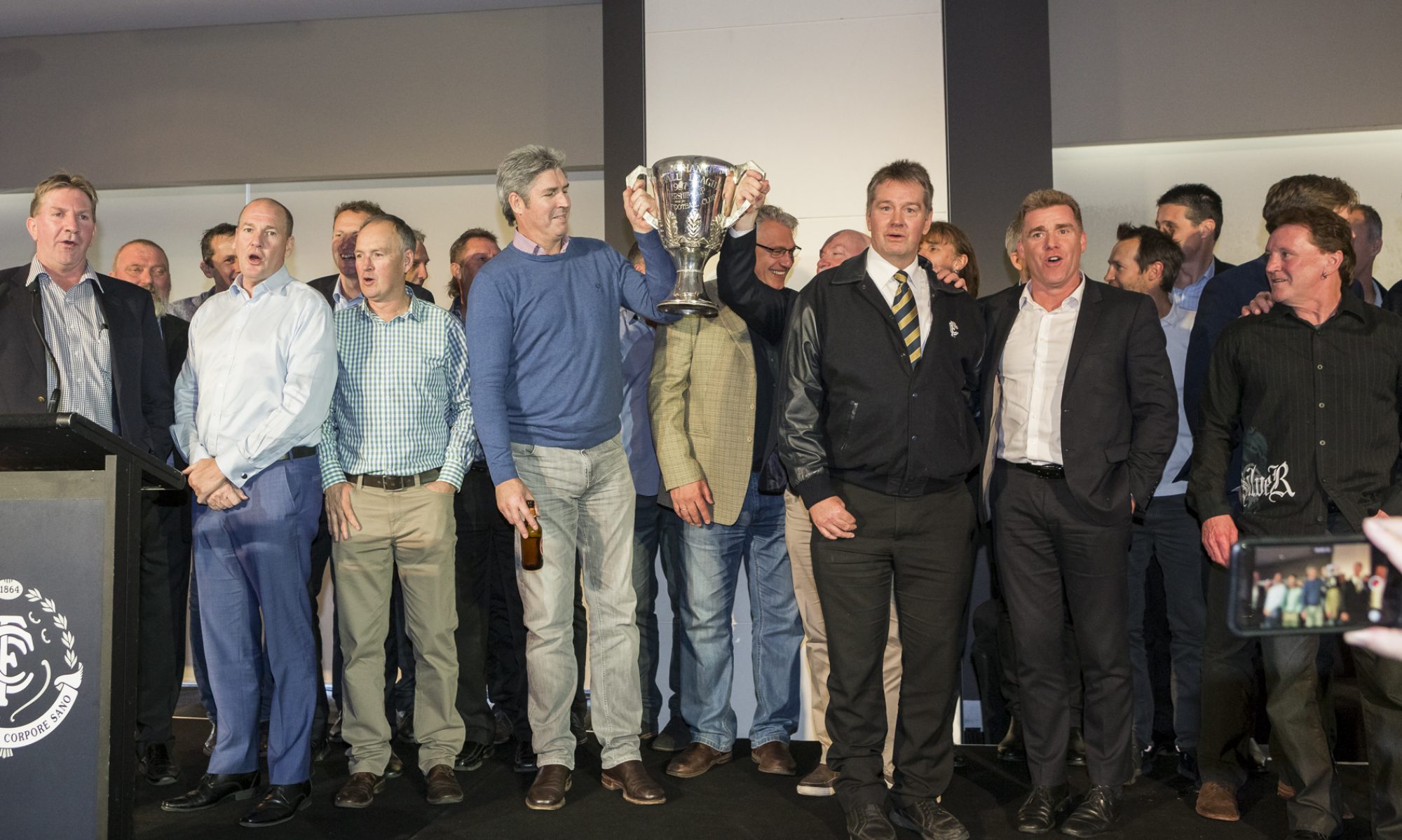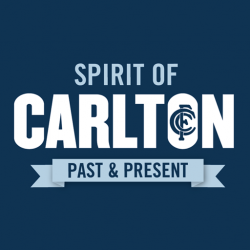Happy 93rd Birthday to Harc Dowsley!
See an excerpt below from the Blueseum article on Harc from 2009.
They were a Great Mob – The Harcourt Dowsley Story
http://www.blueseum.org/tiki-read_article.php?articleId=104
On the eve of the 2009 AFL season, prior to Carlton’s blockbuster first round clash with Richmond at the MCG, the Blueseum was privileged to catch up with one of our club’s living treasures – Harcourt ‘Harc’ Dowsley, who first played for the Navy Blues an amazing 68 seasons ago.
These days he may be a yard or two slower and a few kilos lighter than in his prime, but when 90 year-old Dowsley talks about his brief yet notable career as a league footballer for Carlton, his four years of war in the air piloting flying boats in the Pacific during World War II, and his post-war efforts as a first-class cricketer for Melbourne and Victoria, the passion that drove him in his youth still burns in his clear blue eyes.
‘Call me Harc,’ he insists with a smile, ‘only my mother called me Harcourt – and even then, it was only when I had done something wrong.’ Football is soon mentioned of course, and the memories come flooding back. ‘Carlton was a great club, and they were such wonderful men,’ he says with genuine affection, while recalling his all-too brief, three-game career in the number 20 navy blue guernsey. He swells with pride when he talks about kicking a goal at his first attempt for Carlton, and steering through four majors on debut against St Kilda in May, 1941.
‘I certainly can remember it,’ he says. ‘It was a beautiful day at the old Junction Oval, and I was on cloud nine when we ran out onto the ground. At the age of six or seven, I had decided that the two things I wanted most in my life were to play first class cricket, and to play league football. I had already volunteered to join the air force and I didn’t know what the future held – but at least I was about to achieve one of my main ambitions.’
It was a time of apprehension and uncertainty for all Australians. In Europe, France and the low countries had fallen to a remorseless German army, while to the north of Australia, the sabre-rattling Japanese would soon be on the march through south-east Asia. With our continent under threat, thousands of young Australians – including hundreds of VFL footballers – were flocking to volunteer for military service.
Twenty year-old Harc Dowsley and his older brother Bill volunteered together for duty as RAAF aircrew in August 1940, but the sheer volume of applicants and a shortage of equipment meant that they both had to bide their time until there were places available for them. Meanwhile, they joined the Militia (or Army Reserve) and went on with their sporting interests.
A gifted, natural sportsman throughout his education at Melbourne Grammar School, Harc Dowsley emerged as a punishing right-hand opening batsman in summer, and a dashing, long-kicking key defender on the football field in winter. At the tender age of nine (yes, nine) he had regularly driven his classical right-foot drop-kicks more than 40 metres, and he was a trail-blazer in his teens when he began running off his opponent deep in defence, to set up play with accurate kicks to position.
Remarkably, Dowsley played as an amateur throughout his football career. It was a deliberate decision, taken to ensure that his ambition of reaching the elite level of Australia’s two most popular sports could not be compromised, and it turned out to be a wise move.
Harc attracted serious attention from a number of VFL clubs after starring at full-back for Old Melbournians in their successive B and A section Premiership victories in 1938 and 1939. Melbourne, however, had first call on the rangy 188 centimetre defender, and by early 1941, he was playing solid football on the last line for the Demons’ seconds.
The problem was that Melbourne was the dominant team of that era, and they were already shaping up as premiers for the third year in succession. The possibility of Harc forcing his way into the seniors seemed slim. Then a chance meeting with Carlton’s Jim Francis changed everything.
Dowsley and Francis had built both a healthy rivalry and a long-running friendship after numerous clashes on the cricket field, so Harc listened when Francis said, ‘why don’t you come up to Carlton, Harc? We’d like to play Ken Baxter at centre half-back, so we’re looking for a forward. You can take a good mark, and you can kick the ball a country mile.’
Facing his call-up by the air force sometime in the very near future, the opportunity for Harc to grasp one of his great ambitions was a powerful temptation. He thought briefly, then told Francis that yes, he would take a punt on Carlton.
To his relief and gratitude, Melbourne understood his situation, and didn’t stand in his way. Essendon made a late approach through another of Harc’s cricketing associates, Dick Reynolds, but Harc had given his word and was on his way to the Blues.
In fact, by then, the Dowsley family already had a strong association with the Carlton Football Club through Harc’s grandfather, William Dowsley. A successful newsagency proprietor and real estate agent in West Brunswick, he had been a club supporter, committee member and benefactor for many years, and was still widely remembered when Harc first arrived at Princes Park. ‘One of my fondest memories is of hearing people around the club saying, ‘he’s come home to Carlton’, says Harc, ‘and that was rather nice.’
What was not quite so nice was the embarrassment of his first night at training. ‘I was a bit of a dag, and maybe a bit swollen-headed when I turned up at my first training session,’ he says, ‘without my football boots. Thankfully, Horrie Clover took a liking to me, and said, ‘come with me, son.’ He dug out a couple of old pairs he’d left somewhere around the place, so I can say that in my first run at Carlton, I wore a champion’s boots. But I paid for it later, because they were a little too small for me.’
Horrie Clover also passed on some tips about forward play that would soon bear fruit. ‘He told me to always kick the ball high over the posts, not between them,’ says Harc. ‘Because if the ball drifts over the post, it can’t hit it – and the goal umpire will usually give you the benefit of the doubt.’ Within weeks, Dowsley would be putting that advice to good use.

